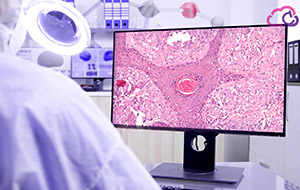CLARIFY
CVBLab-UPV leads a European project about digital pathology to aid in diagnosis of three types of cancer
[ 11/01/2021 ]
The Universitat Politècnica de València (UPV), through the group CVBLab-I3B, is leading CLARIFY, a European project focused on digital pathology. CLARIFY’s aim is to facilitate the diagnosis of three types of cancer: triple-negative breast cancer (TNBC), high-risk non-muscle invasive bladder cancer (HR-NMIBC) and Spitzoid Melanocytic Lesions (SML). Diagnosing any of the three cases is complex and implies a challenge that CLARIFY seeks to provide a response for.
In order to do that, the CLARIFY project works on the development and implementation of advanced artificial intelligence (AI) techniques, image processing and cloud computing applied to the field of digital pathology, and also promoting a European research network that integrates European experts in each one of these fields and in medicine. This network will create new synergies between experts in engineering and medicine; it will contribute to improve the exchange of knowledge and assist in decision-making in diagnosis and treatment.
“In the current practice that is mainly based on a qualified pathologist's subjective interpretation of microscopic images, diagnosing cancer is still a laborious process. This limitation is amplified in small pathology departments, in which pathologists may not be highly specialized in certain areas. CLARIFY will help to overcome these limitations,” says Valery Naranjo, leader of the project and coordinator of the Computer Vision and Behavior Analysis Lab (CVBLab) at the Institute for Research and Innovation in Bioengineering (i3B) of the UPV.
AI techniques, innovative software and excellence training
The CLARIFY team is working on developing and implementing advanced decentralized medical data management models, new artificial intelligence methods, and advanced cloud computing techniques that will facilitate the automatic interpretation of Whole Slide Images (WSI), as well as in an innovative diagnosis software.
“With these tools, CLARIFY will facilitate WSI interpretation and diagnosis, helping medical professionals in their daily work,” explains Sandra Morales, researcher at the CVBLab-I3B of the Universitat Politècnica de València.
In addition, CLARIFY will carry out an ambitious multidisciplinary training program, which will allow twelve young researchers from different nationalities to complete their doctorate studies in one of the institutions within the project, discover the latest scientific advances in AI, cloud computing and digital pathology, and promote new skills that are essential to providing responses to the challenge generated by the engineering-medicine binomial for the coming years.
CLARIFY brings together internationally renowned scientific staff in these fields, belonging to different universities, academic hospitals, and the industry. Along with UPV, the INCLIVA Biomedical Research Institute, the University of Granada, the University of Amsterdam, the Erasmus University MC Rotterdam, the University of Stavanger, the Stavanger University Hospital, and the companies bitYoga and Tyris Software are also participating in this project.
ITN-Horizon 2020 in the EU
CLARIFY is funded by the European Union program Horizon 2020, within the Innovative Training Networks (ITN), whose objective is to train, through an international network of public and private centers, a new generation of creative and innovative researchers, able to transform the knowledge and ideas into products and services at the economic and social service of the European Union.
Outstanding news
 ARWU 2023
ARWU 2023
The Shanghai ranking reaffirms the UPV as the best polytechnic in Spain for yet another year
 Science Meets Regions CV 2023
Science Meets Regions CV 2023
The UPV and the Almussafes City Council begin a collaboration in search of solutions to maintain the automobile sector in the Valencia Region
 Scientific reference
Scientific reference
Avelino Corma, Distinguished Research Assistant at the UPV, awarded an Honorary Doctorate by the University of Huelva
 Micronanofabs NTC UPV-PERTE CHIP Conference
Micronanofabs NTC UPV-PERTE CHIP Conference
María Marced, TSMC Europe president: "The sector's future is bright, the market is expected to double by 2030"
 Goya nomination
Goya nomination
Javier Polo, who holds a degree in Audiovisual Communication from the UPV, directs the successful short documentary Una terapia de mierda
 Sant Carles Medal 2023
Sant Carles Medal 2023
The Faculty of Fine Arts of the UPV awards the Sant Carles Medal 2023 to outstanding Valencian art and culture figures





